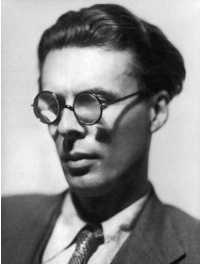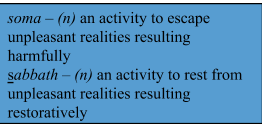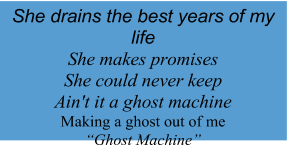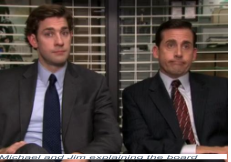Written By: Nathan Ecarma
Managing Editor
Discerning the difference between soma and sabbath
Life is hard. No doubt about it. And when it is, we naturally turn to comforts. And these comforts hurt us more than help us. This phenomenon is known as escapism: the process of seeking distraction to avoid unpleasant realities. In Aldous Huxley’s most popular novel, Brave New World, (1932) he prophetically outlines this phenomenon by creating the symbol soma in his novel.

In the novel, soma is an actual drug. A drug that allows anyone to escape their immediate circumstances and enter a paradise of sorts. Huxley writes of soma: “”All the advantages of Christianity and alcohol; none of their defects.” It brings about a pseudo-happiness and comfort. And no one is left with a hangover. Anytime any of the characters face a discomfort, they take a soma.
Huxley describes a character facing a trial: “Punctured, utterly deflated, he dropped into a chair and, covering his face with his hands, began to

weep. A few minutes later, however, he thought better of it and took four tablets of soma.” One moment, he’s weeping. Another, he’s daydreaming. But then later, he’s hit with harsh reality only having been hurt by his soma trip.
While we have actual drugs today, soma, to Huxley, was more than that. Prophetically, Huxley outlined a vision of a people enslaved to their soma. Believe it or not, we all have our own soma. Personally, my soma includes: eating, social media, sleep, Netflix, music, intellectual thought, eating, working out, and driving. Keep in mind, none of these things are “evil.” Rather, it depends on their use. I use them improperly—to escape uncomfortable realities.
A pertinent form of soma today is the iPhone. How often do we scroll on Instagram to avoid awkward social situations? How often do we scroll

Twitter to avoid hurt in our lives? How often do we use our phones to numb?
Throughout the semester, I have been attempting to locate and eliminate any forms of soma in my life. Last semester, I became independent from Netflix—by the grace of God. This semester I’ve become independent from social media—by the grace of God. I continue to cut out soma in my life, but as a result, I have lost many beloved leisurely activities.
Recently, after a hard conversation, I took a nap, and afterwards I felt guilty because I assumed my nap to be a soma, but after discussing it with my mentor, he reminded me how that was me simply taking a sabbath. I confused soma with sabbath. So, I have begun to consider what is soma and what is sabbath—restful and refreshing.
Usually, sabbath refers to the day of rest for the Christian, but for the purposes of this article, it has a broader definition with the same roots. 
To escape reality, I often will sleep or watch Netflix. This is my mindset—to escape. And when I go in with that mindset, I leave these activities more drained than before. This is the result of soma. Jon Foreman of Switchfoot, outlines the effects of modern soma in his song Ghost Machine.
Foreman explains how our somas leave us empty and drained—ghosts. Similarly, soma is a pseudo-form of pleasure. It does not rejuvenate nor does it give-life. It makes empty promises of rejuvenation. Instead, it’s a place holder or distraction from actual pleasure.
 The difference between soma and sabbath lies in the user’s intention. I use soma to escape; to avoid; to suppress; to numb; to ease. I use sabbath to rest; to rejuvenate; to refresh; to glorify; to encourage.
The difference between soma and sabbath lies in the user’s intention. I use soma to escape; to avoid; to suppress; to numb; to ease. I use sabbath to rest; to rejuvenate; to refresh; to glorify; to encourage.
Soma is used to avoid; meanwhile, sabbath is used to withdrawal. When nothing can be done about the problem, it’s acceptable to sabbath—‘change the channel’ via the leisurely activity. However, when something can be done about the problem, instead of embracing it, you ‘change the channel’ via a leisurely activity, thus using soma.
Often, using a sabbath to withdrawal helps. A prime example comes from my favorites TV series, The Office, a mockumentary of a paper company. 
During this episode, the office faces a crisis: possible downsizing. Everyone frets as they can’t do anything. Jim, a co-manager, attempts to relieve their stresses by asking them to go about business as usual. It doesn’t work. Then, Michael gathers everyone and presents his favorite role playing board game. Confused, Jim attempts to bring Michael back to reality. But Michael calls the shot. And everyone dives into the game foregoing their stress about possibly downsizing.
 Sometimes it’s about getting through the hard time. And sabbath can help that. Jim from The Office explains, “I think today was a good day to have two managers. ‘Cause if you’re a family stuck on a lifeboat in the middle of the ocean, one parent might want to just keep rowing. But if the other parent wants to play a game, it’s not because they’re crazy. It’s because they’re doing it for the kids. And I get that now.”
Sometimes it’s about getting through the hard time. And sabbath can help that. Jim from The Office explains, “I think today was a good day to have two managers. ‘Cause if you’re a family stuck on a lifeboat in the middle of the ocean, one parent might want to just keep rowing. But if the other parent wants to play a game, it’s not because they’re crazy. It’s because they’re doing it for the kids. And I get that now.”
Because Michael lacked any solution to their problem, Michael encouraged everyone to ‘change the channel,’ with a sabbath, so as not to dwell on an issue that couldn’t be helped. Eventually, the office was not downsized, and so Michael saved them all from a day of fretting unnecessarily. Motivations and intentionality play a key role in discerning whether a soma or sabbath was used. Michael intentionally used a fun activity to withdrawal from their stressful situation.
Furthermore, there is a difference between harmful escapism and genuine pleasure. To extend my last example, Netflix, or specifically, The Office, can be used for both. I can use it to escape problems, but I can also use it for pleasure. I enjoy watching the show and discussing the ingenuity of the writers and actors; I can, however, use it to escape, which results harmfully, as I will be thrown back into reality, eventually.
Ultimately, we all use soma. But not many use sabbath. Yet, sabbath restores while soma hurts. Humanness necessitates rest. Take it. Be intentional with your activity.
Bio:
Nathan Ecarma studies Bible, culture, and language. He serves on the Worldview Initiative and as a Managing Editor for the school newspaper, the Bryan Triangle. In between theological conversations, he enjoys binge watching Netflix and attempting to sing his favorite songs. 



